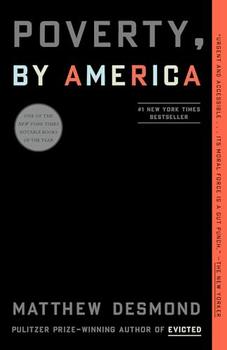Summary | Excerpt | Reading Guide | Reviews | Beyond the Book | Readalikes | Genres & Themes | Author Bio

Chapter 1
The Kind of Problem Poverty Is
I recently spent a day on the tenth floor of Newark's courthouse, the floor where the state decides child welfare cases. There I met a fifty-five-year-old father who had stayed up all night working at his warehouse job by the port. He told me his body felt heavy. Sometimes when pulling a double shift, he would snort a speedball—cocaine mixed with benzodiazepine and morphine, sometimes heroin—to stay awake or dull his pain. Its ugly recipe was laid bare in the authorities' toxicology reports, making him look like a career junkie and not what he was: an exhausted member of America's working poor. The authorities didn't think the father could care for his three children alone, and their mother, who had a serious mental illness and was using PCP, wasn't an option either. So the father gambled, surrendering his two older children to his stepmother and hoping the authorities would allow him to raise the youngest. They did. Outside the courtroom, he hugged his public defender, who considered what had happened a real victory. This is what winning looks like on the tenth floor of Newark's courthouse: giving up two of your children so you have a chance to raise the third alone and in poverty.
Technically, a person is considered "poor" when they can't afford life's necessities, like food and housing. The architect of the Official Poverty Measure—the poverty line—was a bureaucrat working at the Social Security Administration named Mollie Orshansky. Orshansky figured that if poverty was fundamentally about a lack of income that could cover the basics, and if nothing was more basic than food, then you could calculate poverty with two pieces of information: the cost of food in a given year and the share of a family's budget dedicated to it. Orshansky determined that bare-bones food expenditures accounted for roughly a third of an American family's budget. If a family of four needed, say, $1,000 a year in 1965 to feed themselves, then any family making less than $3,000 a year (or around $27,000 at the beginning of 2022) would be considered poor because they would be devoting more than a third of their income to food, forgoing other necessities. Orshansky published her findings in January of that year, writing, "There is thus a total of 50 million persons—of whom 22 million are young children—who live within the bleak circle of poverty or at least hover around its edge." It was a number that shocked affluent Americans.
Today's Official Poverty Measure is still based on Orshansky's calculation, annually updated for inflation. In 2022, the poverty line was drawn at $13,590 a year for a single person and $27,750 a year for a family of four.
As I've said, we can't hope to understand why there is so much poverty in America solely by considering the lives of the poor. But we need to start there, to better understand the kind of problem poverty is—and grasp the stakes—because poverty is not simply a matter of small incomes. In the words of the poet Layli Long Soldier, that's just "the oil at the surface."
I met Crystal Mayberry when I was living in Milwaukee and researching my last book, on eviction and the American housing crisis. Crystal was born prematurely on a spring day in 1990, shortly after her pregnant mother was stabbed eleven times in the back while being robbed. The attack induced labor. Both mother and daughter survived. It was not the first time Crystal's mother had been stabbed. For as far back as Crystal can remember, her father beat her mother. He smoked crack cocaine, and so did her mother; so did her mother's mother.
Crystal's mother found a way to leave her father, and soon after, he began a lengthy prison stint. Crystal and her mother moved in with another man and his parents. That man's father began molesting Crystal. She told her mother, and her mother called her a liar. Not long after Crystal began kindergarten, Child Protective Services, the branch of government tasked with safeguarding children from maltreatment, stepped in. At five, Crystal was placed in foster care.
Excerpted from Poverty, by America by Matthew Desmond. Copyright © 2023 by Matthew Desmond. Excerpted by permission of Crown. All rights reserved. No part of this excerpt may be reproduced or reprinted without permission in writing from the publisher.
Your guide toexceptional books
BookBrowse seeks out and recommends the best in contemporary fiction and nonfiction—books that not only engage and entertain but also deepen our understanding of ourselves and the world around us.